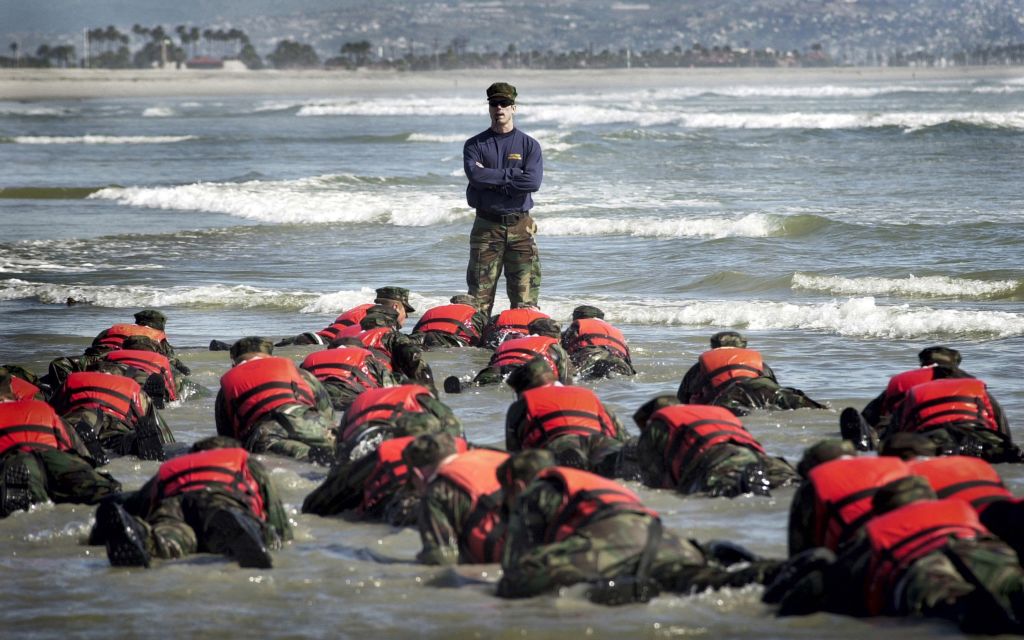I'm a red-blooded American male. That means I can still tell you exactly when I fell in love with the Navy SEALs. It was when I walked into the Blockbuster Video near my house (ah, simpler times) and saw Charlie Sheen staring back at me from the cover of the Navy SEALs VHS box, inviting me into a beautiful new world of violence, sadism, and ruthless power.
Childish? Perhaps. Sappy? Guilty as charged. But I tell you this: I'd give anything to return to those more innocent times, when I was first becoming a diehard fan of the Navy SEALs. That's because when I look at the program today, the one that produced so many extra-legal acts of violence that captured my adolescent heart and mind, I don't recognize what I see.
Yesterday, I went through my regular routine of cracking open The New York Times while sipping my morning protein shake, and what I saw broke my heart.
In the paper was an article by Dave Philipps, about a 24-year-old soldier who died while going through the Navy SEALs training program, known as Hell Week.
A tragedy, to be sure, but not something that shakes my faith in the SEAL program. A barbaric training ritual that maims and sometimes kills its participants is the price of greatness, and thus something all SEALs fans can be proud of.
What I can't be proud of is Navy SEALs using performance enhancing drugs to gain a competitive edge:
Still, the prevalence of drugs at BUD/S has some men in the top reaches of the SEALs deeply unnerved — not just because drugs may have contributed to the death of a sailor, but also because they see their spread, and the lack of discipline and order it implies, as a threat to the entire SEAL organization that could grow in unpredictable and ugly ways.
Sailors who enter the program bolstered by steroids and hormones can push harder, recover faster and probably beat out the sailors who are trying to become SEALs while clean, said one senior SEAL leader with multiple combat deployments to Iraq and Afghanistan. The inevitable effect, he said, is that a course designed to select the very best will end up selecting only the very best cheaters, and steadily fill the SEAL teams with war fighters who view rules as optional.
“What am I going to do with guys like that in a place like Afghanistan?” said the leader. “A guy who can do 100 pull-ups but can’t make an ethical decision?”
The New York Times
In the hours since I read those words, I've been questioning everything I thought I knew about the Navy SEALs.
I thought about Seal Team 6, heroes of mine, and the night they killed Osama bin Laden. When they bravely crashed their helicopter into bin Laden's yard and then shot the old man in his bedroom, were PEDs coursing through their veins? Could it be that the soldier who canoed bin Laden well after he was dead, one of the greatest achievements in the history of the SEALs, didn't do so cleanly?
What about all those SEALs who racked up historic body counts in Central America and then established their own drug smuggling operations? Was it just HGH that earned them their place in the history books?
I shudder to think that the SEALs who killed a Green Beret, possibly because he discovered that they were stealing money meant for informants, might have achieved that memorable victory the easy way, with the aid of under-the-table supplements.
These are the questions that rattled around in my mind as I completed my fifth set of pull-ups. The more I strained, the sadder I became. Sad for our country, for the SEALs who still execute murders and kidnappings cleanly, and for fans like me.
Most of all, I felt sad for my son, who I still haven't talked to about this mess. Kids at school have started whispering about it, and I know he has questions, but I don't know how to answer them.
How do I explain to him that that day we spent cheering and hugging in front of the TV after Eddie Gallagher received his pardon has now been tainted forever?
How do I tell him that one of the most accomplished and sadistic murderers of all time may have only gotten where he is today because of some chemicals in a syringe?
How do I tell him that the Chris Kyle poster in his bedroom needs to come down?
The irony is, I always turned to the lessons the SEALs taught me when I needed to have tough conversations with my boy in the past. Last night I found myself reaching for the copy of Fearless: The Undaunted Courage and Ultimate Sacrifice of Navy SEAL Team SIX Operator Adam Brown, which I always keep by my bedside table.
I had forgotten that I threw it in the trash.






